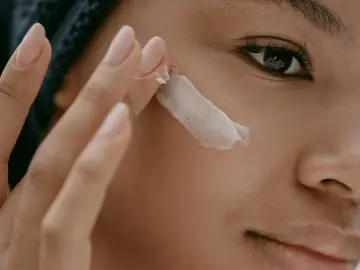For some skin care issues, off-the-shelf solutions just won’t do the trick, and it’s necessary to consult with your doctor or dermatologist to get a little specialist help. For long-term issues that won’t go away (complaints like acne and rosacea for example) it’s often best to see a professional who will be able to advise you on the best course of treatment for your problem.But what’s the difference between prescribed and non-prescribed skin care? And why can’t you get hold of some of these stronger products over the counter? In this post, Save Face answers these questions and more, so that you’ve got the information you need to give your skin the care it deserves.
Acne
Over the counter acne treatments (such as gels, creams and face washes) tend to contain a chemical compound called benzoyl peroxide, which works to unclog pores and kill the bacteria associated with acne. This treatment usually takes about four weeks to work, but is only successful when used on mild to moderate acne. Side effects include dry skin and sun sensitivity, and the product itself can also bleach fabrics so care should be taken at all times.
Prescribed acne treatments such as retinoids are more suited to persistent, severe acne. They work by reducing the skin’s production of sebum and improving the way in which the skin grows and sheds. Retinoids can be either applied topically or taken orally, but oral use must be carefully monitored by a GP as side effects can be significant. Side effects often include dry skin and lips along with muscle and joint pain. In addition to this, it should be noted that it should never be taken by pregnant or breastfeeding women as further side effects include severe birth defects.
Rosacea
Over-the-counter redness reduction products usually contain anti-inflammatories to calm the redness caused by rosacea. These should be used in conjunction with avoiding things that trigger the condition, such as spicy foods, alcohol and direct sunlight. If these types of products don’t work, then a topical antibacterial such as metronidazole can be used to treat the inflammation and redness, or topical or oral antibiotic. Each of these treatments will need to be prescribed by a GP or dermatologist and need to be taken according to their instructions to ensure their safety and efficacy. Side effects of all of the above treatments can include sensitivity to UV light, so care should be taken when using them at all times. The side effects of oral antibiotics can also be significant, and include things such as nausea, bloating, loss of appetite and abdominal pain, so again consult your doctor if you experience any of these things.
Wrinkles
Whilst the above two issues are recognised medical conditions, wrinkles aren’t something that most people would traditionally go and see their GP about. However, if you are willing to pay to see a dermatologist about wrinkles, then they will be able to prescribe more concentrated topical creams than you are able to get over the counter. Retinoids, such as the ones mentioned above as an acne treatment, are also an excellent anti-ageing treatment as they speed up skin cell turnover to smooth wrinkles, fade sun spots and encourage collagen production. Whilst it’s possible to get creams that contain retinol (a derivative of this treatment) over the counter, these are less powerful and aren’t proven to work as effectively. Prescription retinoids are extremely potent, and should only be used exactly as directed by the prescriber. Using too much or applying the product too often can lead to red, flaky skin and cause chronic inflammation, so using them correctly is vital.
Save Face
If you are looking for help with a skin condition but aren’t sure where to start, then selecting a Save Face Accredited Practitioner takes away the hassle of having to sift through hundreds of individuals to ensure that they are appropriately qualified. Ensure you receive the level of care you deserve by using the Save Face search engine today, or ask an expert for further advice.


